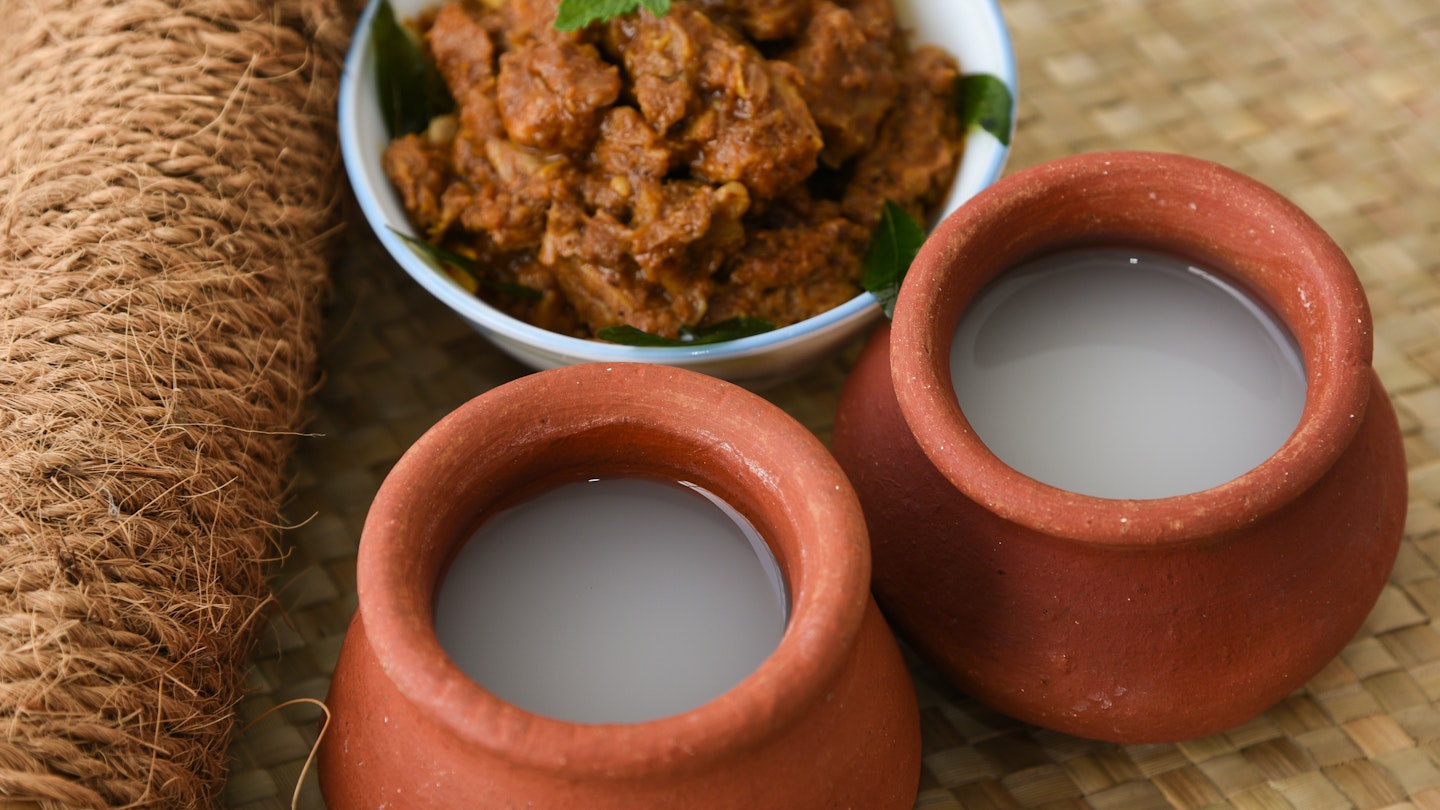Multiple trusted sources assured me a trip to a toddy shop was going to be the ultimate Keralite experience; the milky white, fizzy coconut wine known as kallu is one of India’s best-loved beverages. I didn’t know it would also be a lifeline for my burning tastebuds.
A sparkling, boozy drink made from the sap of coconut palm trees, there are more than 3500 toddy shops in Kerala, selling a bottle for around ₹90-110 (about £1.20/$1.40) per liter. During lockdown, many jobs, including those of farmers leasing out their palms and palm tappers, have been on the line.
After nearly two months, toddy workers are returning to business as usual, tapping an average of 300,000 liters per day. Consequently, this fermented delicacy has a shelf life—if unrefrigerated—of just 24 hours; any longer and the sourness can become unbearable.
One of the most unforgettable experiences of my foodie life was just a short car ride from Kochi. My stay there was drawing to a close, with a flight taking my travel buddy and me to Mumbai a couple of days away. In Maharashtra, toddy shops had been formally banned several times over the last few years, making Kerala our last chance for a sip.
The Toddy Shop Experience
Together with another friend who had experienced her first taste of toddy months prior, we braved the torrid, humid weather to drink kallu in Malayalam, differentiating it from non-alcoholic options. Half an hour later, we reached Udayamperoor, home to a renowned toddy shop called Mullapantha on MLA Road. Its multicolored facade marks the entrance to a solitary oasis in an otherwise dusty, deserted street scorched by the 45°C heat.
In stark contrast to the brightly colored exteriors, the toddy parlour is poorly lit, featuring a handful of plain, laminated plastic tables and chairs scattered around. A glance at other patrons confirms we are the only women present, with at least half a dozen pairs of eyes staring at us. My friend eagerly orders our much-anticipated jug of toddy and starts selecting dishes. I’m unfazed; after all, I can handle the spiciness… or so I thought.
A series of plates parades in front of us: shrimps swimming in a rich, brown curry sea, red fish curry with tapioca, and, of course, appams. These addictive, extra thin, lacy pancakes made from rice flour and coconut complement most meals in the south and help manage the heat of the food.

Right after sinking my teeth into thick, juicy cuts of pork fillet dunked in lava-like hot sauce, my greasy hand reaches for the glass of toddy in front of me, prepared to work its magic. This mildly sour, bubbly wine is the only drink that can help temper such a meal. Milky and opaque in color and light in texture, kallu rolls off the tongue as easily as water, soothing the fiery sensation of my burning mouth.
Dipping my fingers into hot sauce and chugging kallu transforms into a seamless sequence. I repeat this until the dishes in front of me are empty, leaving my stomach happier than anticipated, filled with the most authentic South Indian delicacies.
Back Home
I still think about my Keralite toddy whenever I spot restaurants in North London promising authentic South Indian food. As I skim through their menus, I realize what I’m truly longing for is more than just a glass of coconut palm fizz. I know that no place, however pretty, can recreate that visceral enjoyment of food and drink found in one small toddy shop in Kerala.





